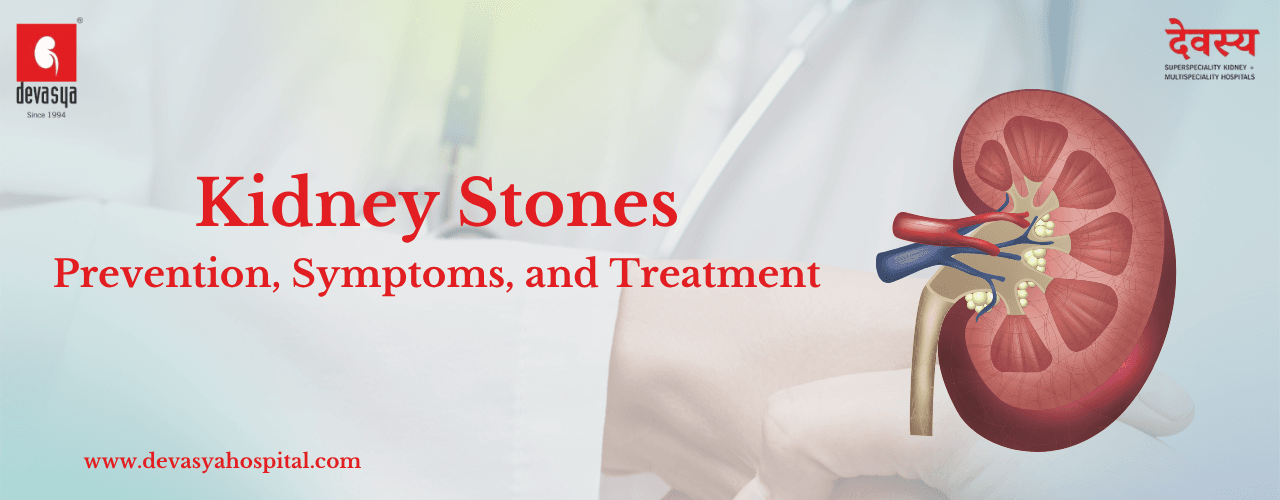Kidney Stones: Prevention, Symptoms, and Treatment
Dr. Dinesh Patel
Learn about kidney stones, their symptoms, causes, treatments, and prevention tips. Stay ahead with expert care and advice from Devasya Kidney Hospital for better kidney health.

Kidney stones may look tiny but their impact on your daily life is anything but. Kidney stones are surprisingly common and can affect anyone. For people having kidney stones, knowledge about them, their different forms and how to manage them can make a huge difference.
This blog by devasya kidney hospital breaks down the how, why, and what-now of kidney stones, giving you the tools to manage the discomfort and take steps to prevent them.
What is a Kidney Stone?
Kidney stones are crystalline deposits that form inside the kidney. These are typically made of minerals and salts that crystallize in the urine and get stuck in the kidney. They may vary in size ranging from small grains to large stones and usually form when the urine becomes concentrated. Also, another important fact to note is that all kidney stones are not the same. Read further to understand what causes a kidney stones and how they can be treated.
Types of Kidney Stones
Kidney stones are different in color, size and composition. Treatment of kidney stones and prevention from formation of new stones depends on the type of stone one has. The different types of stones are:
Calcium stones
Almost 80 percent of kidney stones are calcium stones. These are further divided into calcium oxalate and calcium phosphate stones
- Calcium oxalate: These are by far the most common types of kidney stones and are generally formed due to excess calcium present in the urine. However, there are other causes for kidney stone formations too.
- Calcium phosphate: These stones are commonly linked to conditions like hyperparathyroidism and renal tubular acidosis.
Uric acid stones
Uric acid, a waste product of the human body, is a result of chemical changes in the body. These crystals do not dissolve in the acidic urine and instead form a uric acid stone. These are also associated with high intake of animal protein. Other reasons may include:
- Being overweight
- Having chronic diarrhea
- Suffering from Type 2 diabetes (high blood sugar)
- Gout
Struvite stones
Struvite stones are not a common occurrence and are usually related to chronic infections in the urinary tract. Bacterial infection causes the urine to turn basic as opposed to acidic, providing the perfect environment for formation of Magnesium ammonium phosphate (struvite) stone.
These stones are very large in size and have branches. The growth rate of these stones is also high.people with long-term tubes in kidneys or bladders are more prone to developing struvite stones.
Cystine stones
Cystine stones are a rarity in kidney stones and typically a result of inherited metabolic disorder. Cystine is an amino acid and when kidney’s fail to reabsorb it from urine, a stone is formed.
Understanding the Root Causes of Kidney Stones
Various factors contribute to the formation of kidney stones. Here are a few reasons that can be termed as kidney stone causes among the individuals.
- Low Urine Volume - not enough intake of water or fluids
- Diet - high animal protein, sodium or sugar intake, indulging in too many vitamin c supplements
- Bowel conditions - had stomach or intestine surgery, including gastric bypass surgery
- Medications
- Family history
Some medical conditions also increase the risk of kidney stones. These include:
- Cystic fibrosis.
- High blood pressure.
- Cystinuria, a genetic disorder that causes a buildup of cystine. Diabetes.
- Primary hyperoxaluria.
- High calcium levels in your urine (hypercalciuria).
- Inflammatory bowel disease (IBD).
- Kidney cysts.
- Obesity.
- Osteoporosis.
- Parathyroid disease.
- Hemiplegia or paraplegia (types of paralysis).
- Gout.
What are the first signs of Kidney Stones
In some individuals, symptoms surface quickly, but for others, they may take a significant amount of time to become noticeable. The symptoms also vary depending on the position of the stone in the urinary tract. Some most common kidney stone symptoms include:
- Severe Pain: The most obvious symptom is sharp, cramp-like pain in the back, side or lower abdomen. The intensity of the pain varies with the movement of stone.
- Blood in Urine: presence of stones irritate the urinary tract that sometimes result in bleeding. The color may range from pink or red to brown.
- Frequent Urination: Need to urinate may increase if the stone starts affecting the bladder. One may also feel pain, discomfort or a burning sensation while urinating. The color or odour of urine may also be affected.
- Nausea and Vomiting: Severe pain or upset stomach may lead to feeling nauseous.
- Fever and Chills: Kidney stone may sometimes cause internal infections resulting in fever and chills.
If you observe any of the above symptoms, it is essential to consult your healthcare professional before things escalate.
Treatment Options for Kidney Stones
Kidney stones can be small and sneaky or large and disruptive, and the right treatment for kidney stones depends on your specific case. Here's a closer look at the various options doctors might use to treat kidney stones.
Increased Fluid Intake
Boosting the water intake to around 2–3 litres per day is a straightforward yet impactful method. It encourages the body to pass smaller stones on its own and minimizes the likelihood of new stones developing.
Medications
- Alpha Blockers Sometimes, passing a kidney stone is just about making the journey smoother—literally. Medications like tamsulosin help by relaxing the muscles in your ureter (the tube connecting your kidney to your bladder), giving the stone a better chance to move through with less pain and resistance.
- Stone-Dissolving Medications If your kidney stones are made of uric acid, you might not need any invasive procedures at all. Certain medications can actually dissolve the stones over time, gently breaking them down and clearing them out of your system before they cause bigger problems.
Shock Wave Lithotripsy (ESWL)
This is a non-invasive procedure done to break the larger stones into smaller passable fragments. It uses high energy shock waves to reach the desired effect, facilitating easy passage for the stone via urine.
Ureteroscopy
In this procedure, doctors use a thin, flexible tool to gently navigate through your urinary tract and reach the stone. Once they locate it, they can either break it up using lasers or carefully remove it. It’s a minimally invasive procedure that helps many people avoid more intense surgery.
Percutaneous Nephrolithotomy
If a kidney stone is too large to pass on its own or resistive to other treatments, the healthcare team may recommend a small surgical procedure through the back to remove it safely and directly from the kidney.
Surgery
Open surgery is a rare possibility and only done if the stone size is very large or it is causing some major complications.
Can Kidney Stones be Prevented?
Kidney stones can be painful, but the good news is you can do a lot to prevent them. It starts with the choices you make every day.
Hydrate, because it matters!
Water is the best defense. Drinking 2 to 3 litres daily helps flush out minerals before they can turn into stones. Keep the urine light in color. It is a signal that you are on the right track.
Make Diet Work for You
Lower Salt: Too much salt pushes more calcium into your urine. Cut back on packaged and salty foods.
Balance Proteins: Eating too much animal protein can raise uric acid levels. Try to include plant-based proteins in your meals.
Watch Oxalates: Foods like nuts, chocolate, and spinach are healthy but high in oxalates. If you’ve had stones before, eat these in moderation.
Regulate the calcium intake
Calcium in food is good. It binds to oxalate in the stomach, so less of it ends up in the kidneys. But skip high-dose calcium supplements unless the doctor says otherwise.
Keep a Healthy Weight
Extra weight can lead to chemical imbalances in the urine. Staying active and eating mindfully helps keep the kidneys happy.
Track Your Blood Pressure
Uncontrolled blood pressure can damage kidney function. Keeping it in check helps lower your chances of stone buildup and protects your overall health.
Skip Mega Doses of Vitamin C
Too much vitamin C can increase oxalate levels in your body. Stick to recommended amounts and always check with a doctor before adding supplements.
Medication Can Help Too
If you’re at high risk or have had stones before,the doctor might prescribe medication that prevents new ones from forming. This is especially helpful for those with recurring issues or specific stone types.
Stay Ahead with Regular Checkups
If kidney stones run in the family, or if you’ve had one yourself, regular testing can help spot trouble early. A doctor can guide you in adjusting your habits or treatment plan before things escalate.
Final Thoughts
Kidney stones can turn your day upside down with sudden pain and stress. But the good news is you don’t have to face it alone. Understanding your symptoms and taking timely steps can make a big difference in both treatment and kidney stones prevention.
At Devasya Kidney Hospital,we support you with compassionate care and the latest treatment options. Whether you’re looking for answers or ongoing support, the best kidney specialist in Ahmedabad are ready to guide you toward long-term relief and better kidney health. Reach out today and take the first step toward a healthier, stone-free future.


